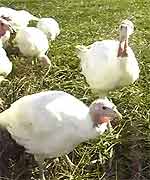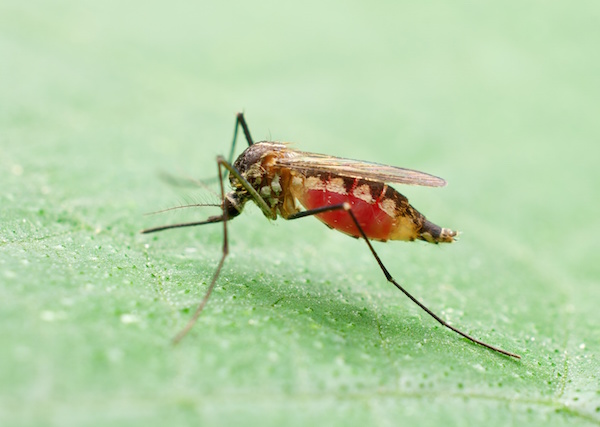
THURSDAY, Aug. 11 (HealthDay News) — Some 107 people in 31 states have now been infected with an outbreak strain of Salmonella Heidelberg found in some ground turkey made by Cargill Inc., the latest report from the U.S. Centers for Disease Control and Prevention shows.
That’s up from last week’s 76 cases in 26 states. Still, only one death from the outbreak, which began in March, has been reported. The outbreak caused the Minneapolis-based Cargill, the third largest producer of turkey products in the United States, to recall 36 million pounds of possibly contaminated ground turkey — one of the largest meat recalls in history.
“The current outbreak of human Salmonella infection associated with turkey meat once again points out the risks associated with the production, handling and preparation of meat and poultry products,” said Dr. Pascal James Imperato, dean of the School of Public Health at the Downstate Medical Center in New York City.
“Salmonella species are frequently present in the intestinal tracts of poultry, including turkeys, and contamination during processing is an ever-present risk,” he added.
The current number of ill individuals identified in each state is as follows: Alabama (1), Arkansas (1), Arizona (3), California (6), Colorado (2), Georgia (2), Illinois (13), Indiana (1), Iowa (2), Kansas (1), Kentucky (2), Louisiana (1), Massachusetts (3), Maryland (1), Michigan (12), Minnesota (2), Mississippi (1), Missouri (4), Nebraska (2), Nevada (1), New York (2), North Carolina (3), Ohio (10), Oklahoma (1), Oregon (1), Pennsylvania (5), South Dakota (3), Tennessee (2), Texas (14), Utah (1) and Wisconsin (4), according to the CDC.
The one death linked to the outbreak involved a case in Sacramento County, Calif., that was reported by state officials, the Associated Press reported.
“The actual number of cases in the current outbreak may be much higher than reported, since Salmonella species can cause a spectrum of clinical illnesses that range from very mild to severe,” Imperato said. “Milder cases resolve quickly and often do not come to medical attention.”
“It is regrettable that people may have become ill from eating one of our ground turkey products and, for anyone who did, we are truly sorry,” Steve Willardsen, president of Cargill’s turkey processing business,” said in a company statement. “We go to great lengths to ensure the food we produce is safe and we fully understand that people expect to be able to consume safe food, each serving, every time.”
Willardsen noted the company has suspended production of ground turkey products at its Springdale, Ark.-based plant until the source of the contamination has been found. All the recalled turkey is from this plant. No contamination has been found in Cargill’s other three turkey processing plants, he added.
According to the agency, cultures taken from four samples of ground turkey obtained from retail outlets between March 7 and June 27 were contaminated with the Heidelberg strain of Salmonella, and that the ground turkey is the likely source of the outbreak.
Another expert, Philip Alcabes, an epidemiologist and professor at Hunter College’s School of Public Health in New York City, commented that this outbreak — like others — is the result of how America produces its food.
“Most of the food that most Americans eat nowadays comes from someplace far away. And much of it is produced industrially,” Alcabes said.
“In this setting, bacterial contamination of foodstuffs is a fact of life. That means that some people get sick each year, and a few die. This is sad, of course, but not remarkable from a public health point of view. It’s the price we pay as a society for our decision to create our food industrially,” he said.
Even before the source of the outbreak had been determined, the U.S. Department of Agriculture’s (USDA) Food Safety and Inspection Service had issued an alert July 29 that “reminds consumers of the critical importance of following package cooking instructions for frozen or fresh ground turkey products and general food safety guidelines when handling and preparing any raw meat or poultry.”
According to the USDA, the Salmonella bacterium can cause salmonellosis, which “can be life-threatening, especially to those with weak immune systems, such as infants, the elderly and persons with HIV infection or undergoing chemotherapy.”
Symptoms of Salmonella poisoning typically arise within eight to 72 hours and can include fever, abdominal cramps and diarrhea. Chills, headache, nausea and vomiting can also occur and symptoms can last up to a week.
The CDC adds that people should check their homes for recalled ground turkey and not eat it. The strain of Salmonella in this outbreak is resistant to several commonly prescribed antibiotics and so may be associated with an increased risk of hospitalization or possible treatment failure in infected people, the agency warns.
How to Prevent Salmonella Illness From Meat
The CDC and the U.S. Department of Agriculture’s Food Safety and Inspection Service offers up these tips to consumers:
- Wash hands with warm water for at least 20 seconds before touching raw meat or poultry, and wash all utensils and dishes with hot soapy water.
- Disinfect cutting boards used for meat or poultry with a solution of one tablespoon liquid, unscented chlorine bleach to one gallon of water.
- Be sure to separate raw meat/poultry from other foods (such as vegetables) that will not be cooked. Use separate cutting boards for meats, poultry, egg products and cooked foods.
- Check with a food thermometer to be sure that the cooking temperature is high enough. Safe internal cooking temperatures for turkey and other poultry is 165 degrees Fahrenheit.
- Be sure to refrigerate raw meat and poultry within two hours after purchase (one hour if temperatures climb above 90 degrees F). Refrigerate cooked meat and poultry within two hours of cooking.
More information
For more information on salmonellosis, visit the U.S. Centers for Disease Control and Prevention.

